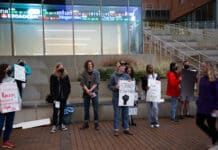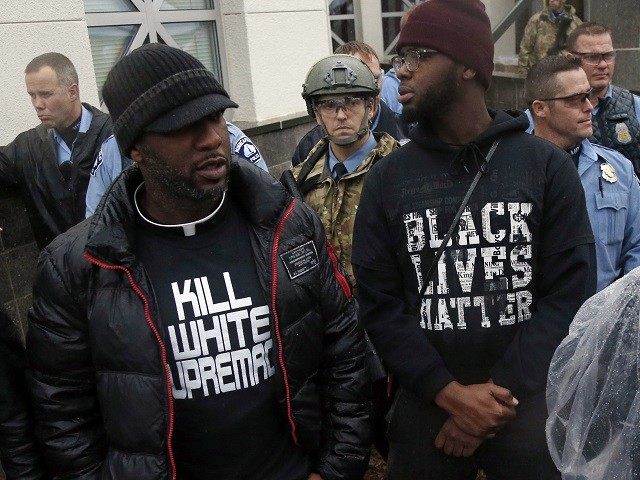“…can we please talk about specifically black people and reparations?”
~Felicia Perry (Artist) to Presidential Candidate Bernie Sanders, February 12, 2016
On Feb. 12, 2016, presidential candidate Bernie Sanders took part in the Neighborhoods Organizing for Change (a former ACORN group) “Black Forum with Bernie Sanders” event in North Minneapolis. Contrary to reports by ConservativeOutfitters.com and the Drudge Report, Sanders was not “run offstage” by the crowd, but was actually enthusiastically applauded by most people in attendance as he left the stage to head to the DFL Hubert H. Humphrey-Mondale Fundraiser in St. Paul.
During the forum artist Felicia Perry asked Sanders: “So the question specifically, my black son…ok, I know you’re scared to say ‘black’…I know you’re scared to say ‘reparations’ because it seems like every time we talk about black people and us getting something for the systematic oppression and exploitation of our people we have to include every other person of color, so today can we please talk about specifically black people and reparations?” (emphasis added in bold).
Sanders responded:
“I believe that in a country which has more income and wealth inequality than any other country, then yeah, the time is long overdue to start investing in poor countries. We have the highest rate of childhood poverty of any major country on earth. Specially within the African-American community. So what I… I’ve said black 50 times. Alright? That’s the 51st time. Alright? But this is a national issue. Alright? So what we want and I believe should do, alright? Is to invest most heavily in those communities most in need. And when you have 35% of black children living in poverty, when you have half of the kids in public schools on free or reduced lunches, when youth unemployment in the African-American community is 51%, those are exactly the kinds of communities that you invest in.”
A day after the NOC Black Forum with Sanders event in Minneapolis The Nation published A Concrete Plan to Make Black Lives Matter. The article’s author, Mychal Denzel Smith, outlines how the group can effect change by “pressuring” elected officials:
…a plan for pressuring whoever is in office, whether they are sympathetic to the causes of racial and economic justice or not. Because we have seen time and again, as Michelle Alexander recently reminded us, that party affiliation or general ease and comfort with black culture does not translate into policies that aim at eradicating racism. Nor is it guaranteed that a political revolution led by a democratic socialist would take seriously the concerns of institutional racism. Most of what appears in the Agenda to Build Black Futures has not made it to the Democratic presidential debate stage…while Bernie Sanders supports a raise in the minimum wage, he hasn’t gone full-socialism and called for either a job guarantee or universal basic income…They’ll need some pressure to shift their focus…And we need organized struggle regardless of who occupies elected office, from the president and Congress down to mayors and city councils. BYP100 draws on campaigns that use the tactics of protest and direct action, media engagement and community outreach, political education, and, yes, voting.
Evidence of groups (Black Lives Matter and Neighborhoods Organizing for Change, et al) utilizing Smith’s plan to pressure “whoever is in office” in Minnesota is shown by Governor Dayton’s proposal for a legislative special session that was to address, along with other issues, the racial income disparities in Minnesota. Before dropping his special session proposal, Governor Dayton sent a letter to Representative Jim Knoblach (R-14B) and Senator Bobby Joe Champion (DFL District 59 – Minneapolis) outlining his goals for the special session. Focusing primarily on improving economic conditions for people of color, he reiterated his earlier request that the special session include “a $15 million dollar investment to improve economic outcomes for communities of color.” Dayton continued with a specific list of items he wanted addressed during the special session:
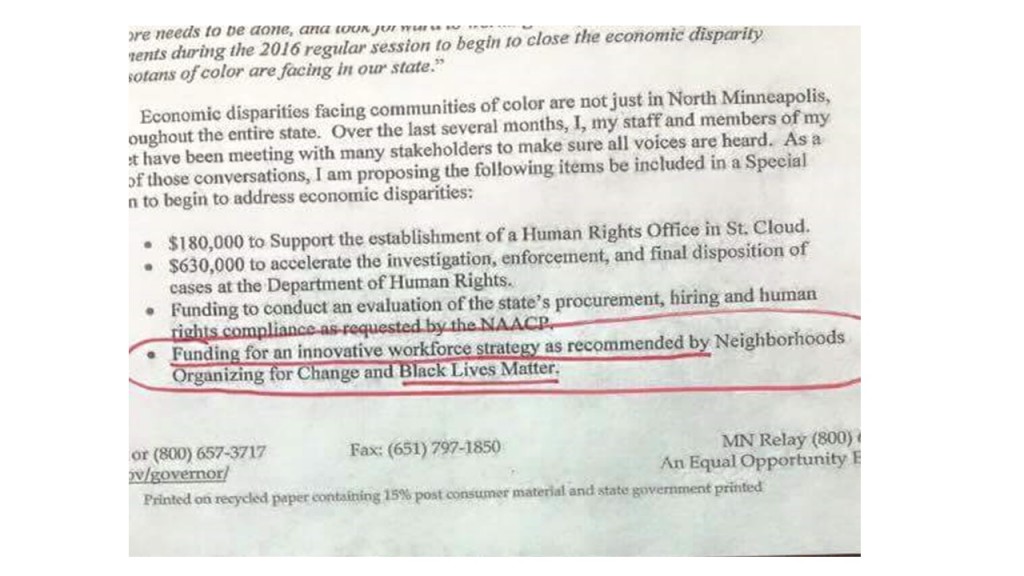
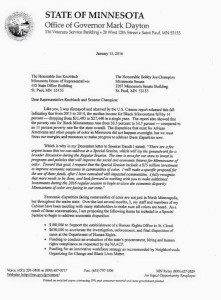
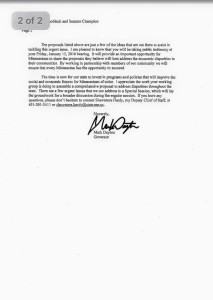
Governor Dayton’s final bullet point references an “innovative workforce strategy as recommended by Neighborhoods Organizing for Change and Black Lives Matter.”
Were those recommendations actually intended to move Governor Dayton and Minnesota toward a reparations policy? In a post (video below) on the Neighborhoods Organizing For Change website, community organizer Tony Williams explains a modernized reparations concept that goes beyond the historical reparations definition (governmental payouts to victimized/oppressed groups of people or their descendants i.e. slavery reparations): “The most common misconception of reparations is that it necessarily involves writing a check to every person who has been harmed. There is more than one way to administer aid. A particularly compelling idea is the “massive investments into education, housing, employment initiatives, and other services available to marginalized communities“(emphasis added in bold).
Comparing the need for restitution for the hundreds of years worth of oppression of African-Americans to the reparations paid by Germany and the USA to the Jewish survivors of the Holocaust and the Japanese-Americans interned during WWII, Williams says, “On larger scales, of course, we paid restitution to Japanese-Americans who were interned during World War II, and Germany paid restitution to victims of the Holocaust for more than a decade. An American reparation program is by no means an impossible goal to accomplish — we just need to allow ourselves to dream a little bigger…So let’s talk about reparations. Let’s talk about divesting from the prison industrial complex and investing in free community college. Let’s talk about ending corporate tax breaks and investing in black entrepreneurs. Instead of building new stadiums, let’s build free housing in every marginalized community in America and end homelessness overnight.”
“Let’s Talk About Reparations” South Minneapolis Neighborhoods Organizing for Change Community Organizer, Tony Williams
Reparation policies are not new objectives for racial economic equity groups. Contrary to statements made by Minnesota Senate Majority Leader Tom Bakk during the Humphrey School for Public Affairs‘ Legislative Session Preview Forum, where he stated that the Black Lives Matter group, “needs to identify a specific goal…have a specific objective in mind…have an objective and a long term strategy…” BLM and other racial equality groups have produced lists of demands that outline their objectives, which include “Pay for Generational Oppression: Reparations Revisited,” a “Workers Bill of Rights,” “Divest and Eliminate Profit from Punishment” and “Stabilize and Revitalize Black Communities.” Notably included within these demands are:
- Budget lines for reparations at municipal, state, and federal government levels to include cash, land, and economic development, scholarship funds for Black students to be paid by colleges and universities that benefited directly from slave labor, and textbooks/other educational materials that accurately depict the history of Black people of the African diaspora – all of which could begin to amend past and persistent injustice and exploitation.
- Restore voting rights to incarcerated people.
- Establish Independent Compensation Commission to process claims and pay compensation for economic, social, psychological, and political damage suffered as a result of the United States’ harmful policies and practices towards Black people.
- All workers should receive a living wage (regardless of education/experience).
- All workers should have protections against discrimination based on past drug offenses or incarceration.
- All gender-based and race-based pay gaps should be eliminated in public and private places of employment.
- All adults who want a job should have a right to employment through public or private opportunities through a federal jobs program.
- All people have a right to a guaranteed living income regardless of employment status.
- Universal child care and renewed investment in quality public schools.
Furthermore, Ta-Nehisi Coates argues that reparations represent more than a governmental payout in “The Case for Reparations” (The Atlantic, June 2014) :
Won’t reparations divide us? Not any more than we are already divided. The wealth gap merely puts a number on something we feel but cannot say—that American prosperity was ill-gotten and selective in its distribution. What is needed is an airing of family secrets, a settling with old ghosts. What is needed is a healing of the American psyche and the banishment of white guilt.
What I’m talking about is more than recompense for past injustices—more than a handout, a payoff, hush money, or a reluctant bribe. What I’m talking about is a national reckoning that would lead to spiritual renewal. Reparations would mean the end of scarfing hot dogs on the Fourth of July while denying the facts of our heritage. Reparations would mean the end of yelling “patriotism” while waving a Confederate flag. Reparations would mean a revolution of the American consciousness, a reconciling of our self-image as the great democratizer with the facts of our history.
If not even an avowed socialist can be bothered to grapple with reparations, if the question really is that far beyond the pale, if Bernie Sanders truly believes that the…political plunder of black communities entitle them to nothing, if this is the candidate of the radical left—then expect white supremacy in America to endure well beyond our lifetimes and lifetimes of our children. Reparations is not one possible tool against white supremacy. It is the indispensable tool against white supremacy. One cannot propose to plunder a people, incur a moral and monetary debt, propose to never pay it back, and then claim to be seriously engaging in the fight against white supremacy (emphasis added in bold).












